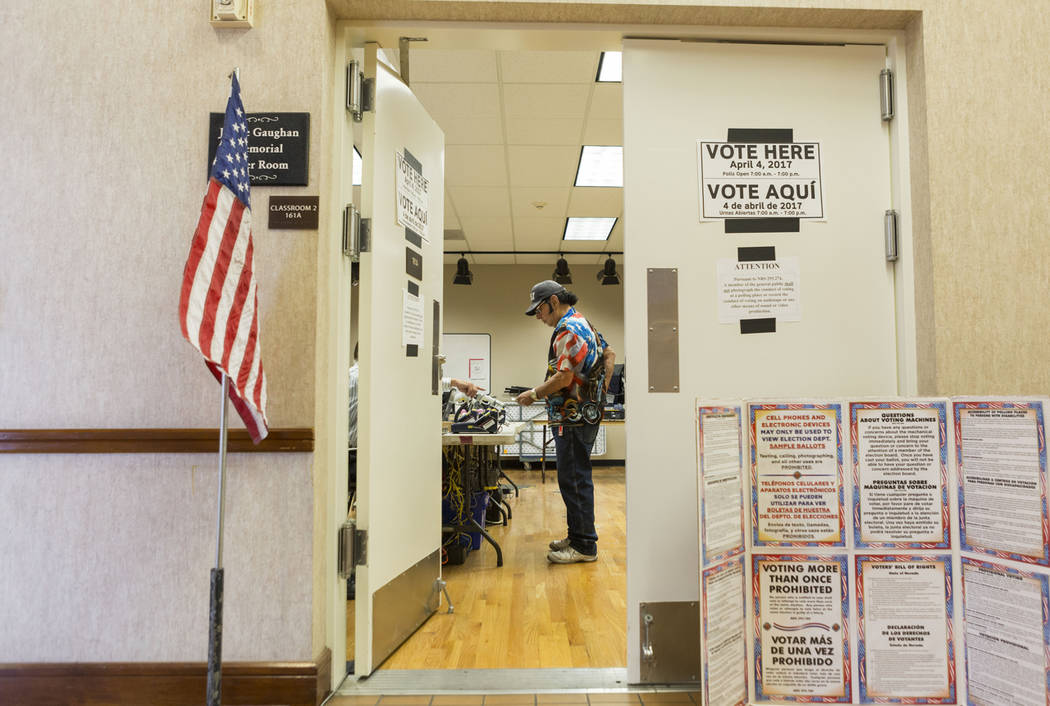It’s long past time to combine all of Las Vegas’s elections

What if they held an election and nobody came?
Well, maybe not nobody. But certainly not a lot of people.
According to the Clark County Election Department, a grand total of 55,867 people voted in the municipal elections last week. That’s just 9.48 percent of the registered voters who could have participated, and even that’s just a small portion of the more than 2 million people who live in Clark County.
Consider this: The top non-judicial vote getter was Henderson Mayor-elect Debra March, who will now lead her city of more than 270,000 people thanks to the votes of 11,367 citizens. North Las Vegas Mayor John Lee will return for another term leading his 227,000-population city as a result of 6,724 votes.
In terms of turnout, 2017 set a new low — literally. From 2009 to 2015, turnout in off-year municipal races has ranged from 10 percent to 18 percent.
You have to ask: Why are we still doing this?
Not elections. We have to do those by law.
No, off-year elections for city council and municipal court seats. Not only do they take place just a few months after the even-year federal-state elections, they also occur during the biennial sessions of the Legislature. People are simply not paying attention.
In addition to all that, these elections cost local governments money; they pay Clark County for staging the vote. If municipal elections were consolidated, local governments wouldn’t have to pay anything, except in the case of a ballot question. Consolidation would undoubtedly increase participation in municipal contests.
In fact, there’s really no good reason not to combine all elections on the even-year cycle.
Yes, local officials say they will have a much harder time capturing the public’s attention on a ballot crowded with races that include, at various times, president, U.S. Senate, Congress, governor, statewide constitutional offices, state Supreme Court, judges, state Senate and Assembly offices, county posts, school board trustees, special district officers and ballot initiatives.
They say it will be harder to raise money during those periods, with everybody else asking for money, too. And it would be harder to buy advertising spots on TV stations flooded with ads from campaigns and outside groups.
And that’s a very sad story. But it’s not the whole story.
Holding off-year elections is easier for campaigns. With far fewer people turning out to the polls, it doesn’t take as much effort to identify supporters and get them to turn out to the polls. Expand the total turnout universe, and that task becomes harder and more expensive.
And, with fewer people turning out, it’s also easier to manage those angry, vengeful voters dissatisfied with a politician’s service. Many incumbents win outright in the primary by earning more than 50 percent (two did last week) or come out with more votes heading into the June runoff.
In fact, only two incumbents who didn’t win outright failed to best the numbers posted by their challengers in last week’s balloting.
The bottom line: It would better for voters to have municipal races consolidated with even-year contests, when they’re already paying attention to politics. It would be better for local governments to consolidate elections and save the money they’re otherwise spending on voting in off-year elections. And while it would make things harder for local officials, it’s a good bet that we won’t see a shortage of candidates for those posts.
The Legislature is in session right now. Consolidation of elections might make a good bill to pass before lawmakers adjourn in June.
Oh, by the way: The municipal runoffs are Tuesday, June 13. Don’t forget to vote!
Contact Steve Sebelius at SSebelius@reviewjournal.com or 702-387-5276. Follow @SteveSebelius on Twitter.












